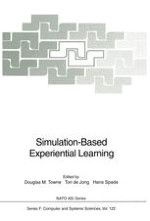1993 | OriginalPaper | Buchkapitel
Exploring a Domain with a Computer Simulation: Traversing Variable and Relation Space with the Help of a Hypothesis Scratchpad
verfasst von : Wouter van Joolingena, Ton de Jong
Erschienen in: Simulation-Based Experiential Learning
Verlag: Springer Berlin Heidelberg
Enthalten in: Professional Book Archive
Aktivieren Sie unsere intelligente Suche, um passende Fachinhalte oder Patente zu finden.
Wählen Sie Textabschnitte aus um mit Künstlicher Intelligenz passenden Patente zu finden. powered by
Markieren Sie Textabschnitte, um KI-gestützt weitere passende Inhalte zu finden. powered by
Computer simulations provide a challenging opportunity to create learning environments in which learners are free to explore the domain and discover the domain properties themselves. Contemporary theories of learning state that knowledge acquired and constructed within such an exploratory environment will be rooted more deeply within the learner’s knowledge structures. On the other hand, it has also become clear that offering a simulation to the learner without offering any additional support may result in learners getting “lost” in the simulation environment, not learning very much. Therefore, additional support is deemed necessary for simulation learning environments.The current chapter describes a software instrument (a “hypothesis scratchpad”) that can be offered to the learner in order to support the process of hypothesis formation. The design of this instrument is based on an analysis of hypothesis space, one of the two search spaces from the theory of Klahr and Dunbar [14], who describe discovery as search in two related spaces, a hypothesis space and an experiment space. A study was performed in which the hypothesis scratchpad was used to influence the learners search processes in variable space and relation space, the two subspaces of hypothesis space. The moment of stating hypotheses (before doing experiments or during a series of experiments) and the guidance for variable space search (starting with instances or directly going to general variables) was varied in this study. It appeared that the learners who were prompted to state hypotheses before doing experiments stated more hypotheses while doing experiments with the simulation. Learners who were searching varibale space only at the level of general variables, chose relations at a more precise level than learners searching variable space, starting with instances before going to the general concepts.
